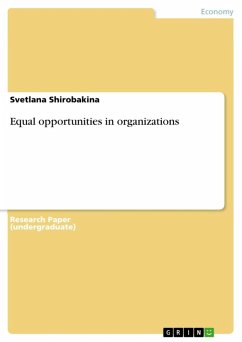Research Paper (undergraduate) from the year 2004 in the subject Leadership and Human Resources - Miscellaneous, grade: 1,3, University of Lincoln, language: English, abstract: We live in a rapidly changing world characterised by the increasing processes of globalisation and internalisation. They open the doors for enlarging opportunities to see different countries, to meet different people. At the beginning of the 21stcentury people are beginning to recognize that diversity is already the fact of life, which has its reflection not only in the public life but also in the workplace. They are learning to understand that all people are different, be it in gender, race, age or personal experience. Therefore, there is the vital need to value "culturally different" people and "create the environment, in which they will flourish". In this context we often think about 'discrimination' as being "basis for selection and promotion" or in its negative form as the process of responding to a person differently on basis of that person's individual differences, which can rise problems in the company's internal environment. Such attitudes are mostly based on the peculiarity of the people to stereotype, which means "to like people who are similar to them and dislike those people who differ from them". This factor hinders the chances for the promotion and limits the potential of disadvantaged individuals depriving them of their basic rights. Equal opportunities policies are being introduced in order to prevent above-mentioned negative form of discrimination. The drive towards equal opportunities for all minority groups has become a business necessity and has taken a new impetus for all organizations. Its basic premise is that talent and ability is equally spread throughout all groups of people including between man and women, able-bodied and people with disabilities etc. Therefore equal opportunities are aimed at ensuring that organization make the best of a diverse workforce rather than losing their talents through discriminatory practices. But they are often negatively viewed by the employers due to their obligatory character. The following section aims to briefly inform about legislation that provides the basis for equal opportunities in social life as well as in the workplace. The first legislation promoting the equality at work between men and women has been the Equal Pay Act from 1970 with an issue "equal pay for equal work". This act provided the legal basis for equality opportunities of women. [...]
Dieser Download kann aus rechtlichen Gründen nur mit Rechnungsadresse in A, B, BG, CY, CZ, D, DK, EW, E, FIN, F, GR, HR, H, IRL, I, LT, L, LR, M, NL, PL, P, R, S, SLO, SK ausgeliefert werden.









